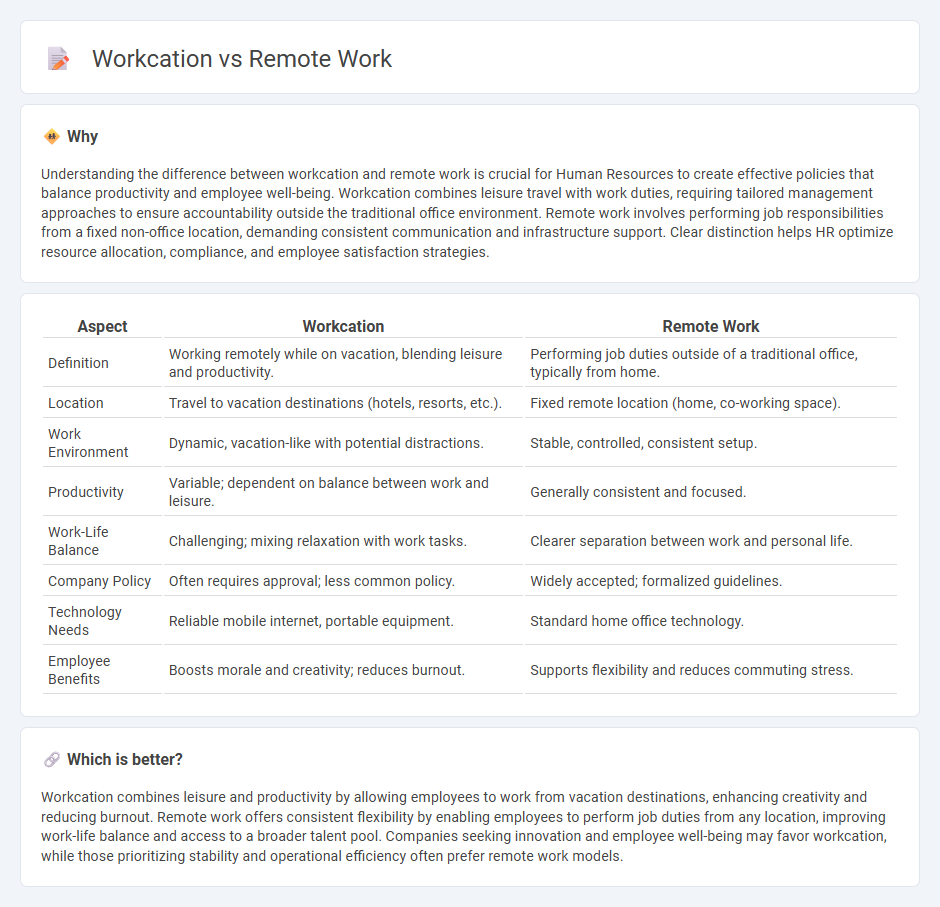
Workcation blends work and leisure by allowing employees to perform tasks while temporarily staying in a different location, often promoting work-life balance and creativity. Remote work, on the other hand, typically involves working from a fixed home or office setup outside the traditional workplace, focusing on productivity and flexibility. Explore more about how these evolving work models impact employee engagement and organizational culture.
Why it is important
Understanding the difference between workcation and remote work is crucial for Human Resources to create effective policies that balance productivity and employee well-being. Workcation combines leisure travel with work duties, requiring tailored management approaches to ensure accountability outside the traditional office environment. Remote work involves performing job responsibilities from a fixed non-office location, demanding consistent communication and infrastructure support. Clear distinction helps HR optimize resource allocation, compliance, and employee satisfaction strategies.
Comparison Table
| Aspect | Workcation | Remote Work |
|---|---|---|
| Definition | Working remotely while on vacation, blending leisure and productivity. | Performing job duties outside of a traditional office, typically from home. |
| Location | Travel to vacation destinations (hotels, resorts, etc.). | Fixed remote location (home, co-working space). |
| Work Environment | Dynamic, vacation-like with potential distractions. | Stable, controlled, consistent setup. |
| Productivity | Variable; dependent on balance between work and leisure. | Generally consistent and focused. |
| Work-Life Balance | Challenging; mixing relaxation with work tasks. | Clearer separation between work and personal life. |
| Company Policy | Often requires approval; less common policy. | Widely accepted; formalized guidelines. |
| Technology Needs | Reliable mobile internet, portable equipment. | Standard home office technology. |
| Employee Benefits | Boosts morale and creativity; reduces burnout. | Supports flexibility and reduces commuting stress. |
Which is better?
Workcation combines leisure and productivity by allowing employees to work from vacation destinations, enhancing creativity and reducing burnout. Remote work offers consistent flexibility by enabling employees to perform job duties from any location, improving work-life balance and access to a broader talent pool. Companies seeking innovation and employee well-being may favor workcation, while those prioritizing stability and operational efficiency often prefer remote work models.
Connection
Workcation and remote work both leverage flexible work environments enabled by advanced digital communication tools and cloud-based platforms. These arrangements enhance employee productivity and job satisfaction by allowing seamless access to work tasks from any location while maintaining professional collaboration. Integrating workcation into remote work policies supports talent retention and promotes work-life balance by blending leisure with professional responsibilities.
Key Terms
Flexibility
Remote work offers unparalleled flexibility by allowing employees to perform tasks from any location with internet access, adapting work hours to personal preferences. Workcation blends leisure and productivity, granting professionals the freedom to explore new environments while maintaining work commitments, promoting work-life balance. Discover how each approach enhances flexibility and which suits your lifestyle best by exploring our detailed guide.
Productivity
Remote work offers consistent productivity by enabling employees to maintain their usual routines and access to work tools from home or any location with internet connectivity. Workcations blend work responsibilities with leisure in new environments, which can boost creativity and motivation but may also introduce distractions impacting output. Explore strategies to balance workcation benefits with sustained productivity for optimal results.
Work-life balance
Remote work allows employees to maintain a steady work-life balance by providing flexibility to complete tasks from any location, reducing commute time and increasing productivity. Workcation combines the benefits of remote work with leisure travel, enabling individuals to rejuvenate while staying connected to their job responsibilities, fostering enhanced creativity and job satisfaction. Explore how integrating remote work and workcation strategies can optimize your work-life harmony and overall well-being.
Source and External Links
What Is Remote Work? Ultimate Guide | Wrike - Remote work is a professional environment where employees work outside their company's physical office, often from home or any location, enabled by digital tools like Slack and Zoom, reshaping productivity and work-life balance.
What is the definition of remote work? - OPM.gov - Remote work is defined as a flexible work arrangement where an employee performs work at an alternative worksite under a written agreement, without regular or recurring work at the agency's physical site.
Remote Work: Jobs, Companies & Virtual Teams - Remote.co - Remote.co offers resources and job listings for flexible, work-from-home roles across various industries, connecting workers with employers embracing remote and hybrid models.
 dowidth.com
dowidth.com